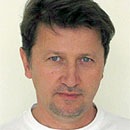Advisory Board and Editors Molecular Biology

Jiri Vondrasek
Head of Bioinformatics Department at Institute of Organic Chemistry and Biochemistry, Academy of Sciences of the Czech republic, lecturer at faculty of natural sciences, Charles University - Prague, vice president of the Czech Bioinformatics Association and national coordinator of the European infrastructure for biological data - ELIXIR.

Khor Waiho
Researcher at the Institute of Tropical Aquaculture and Fisheries, Universiti Malaysia Terengganu. Dr. Khor Waiho obtained his Ph.D. in Aquaculture from Universiti Malaysia Terengganu (2016) and completed a 2-year postdoctoral (Biology, 2017-2019) at Shantou University, China. His current research focus includes the impact of climate change on crustacean growth and reproductive biology, population biology and fishery, and the aquaculture of economically important crustacean species.

Henning Walczak
Recipient of the Wellcome Trust Senior Investigator Award (2011) and an ERC Advanced Grant (2011). Director of the European Workshop on Cell Death (EWCD) Charity.

Ping Wang
Associate professor of Pediatrics, Microbiology, Immunology, and Parasitology with the research emphasis on molecular mechanisms of fungal pathogenesis.

Ingrid M Weiss
Professor for Biobased Materials at IBBS - Institute of Biomaterials and Biomolecular Systems, University of Stuttgart, Germany.
Past Head of Biomineralization at INM – Leibniz Institute for New Materials, Saarbrücken, Germany and Private Lecturer "Biochemistry" at the University of Regensburg, Germany.

Gary M. Wessel
Professor of Biology in the Department of Molecular Biology, Cellular Biology, and Biochemistry at Brown University.

Siouxsie Wiles
Dr Siouxsie Wiles MNZM studied medical microbiology at the University of Edinburgh, followed by a PhD in microbiology at the Centre for Ecology and Hydrology in Oxford and Edinburgh Napier University. She is currently an associate professor at the University of Auckland. There she heads up the Bioluminescent Superbugs Lab where she and her team make nasty bacteria glow in the dark to find new antibiotics and to better understand how bacteria become more infectious. Siouxsie has won numerous awards for both her science and her science communication. In 2017 she published her first book, ‘Antibiotic resistance: the end of modern medicine?’ and in 2019 was appointed a member of the New Zealand Order of Merit for services to microbiology and science communication. When the pandemic arrived, Siouxsie joined forces with Spinoff cartoonist Toby Morris to make the science of COVID-19 clear and understandable. Their award-winning graphics have been translated into multiple languages and adapted by various governments and organisations around the world. Siouxsie was the Supreme Winner of the Stuff Westpac 2020 Women of Influence Award, named by the BBC as one of their 100 influential women of 2020, and in 2021 was named Kiwibank New Zealander of the Year.

Albert HC Wong
Albert H.C. Wong is a neuroscientist and psychiatrist at the Centre for Addiction and Mental Health, and a Professor at the University of Toronto. He attended medical school at the University of Toronto, where he also completed specialty training in psychiatry and a PhD in neurobiology. Dr. Wong’s lab uses animal models and clinical studies to investigate genetic, epigenetic and developmental mechanisms of psychiatric disease. His areas of clinical expertise are in schizophrenia and brain stimulation.

Susanna A Wood
Susie is a freshwater scientist and molecular ecologist based at the Cawthron Institute in Nelson, New Zealand. Her research is multidisciplinary and integrative, with the overarching goal of improving knowledge on freshwater ecosystems. It spans three broad areas: (i) toxic cyanobacteria dynamics in freshwater systems (both planktonic in lakes and benthic in rivers), (ii) the development and application of molecular techniques to monitor and understand aquatic systems, and (iii) integrating cutting edge techniques with more traditional paleolimnological approaches to guide future lake management and restoration. Wood is the co-programme leader of a project funded in 2017 known as ‘Our lakes’ health: past, present, future’ (www.lakes380.com). The team is obtaining a nationwide overview of health for about 10% of New Zealand’s lakes using paleo-environmental reconstructions. The team is using sediment coring, novel proxy analyses (environmental DNA, high-resolution core scanning), geochronology and mātauranga Māori (indigenous knowledge) to reconstruct water quality and lake health over the past 1000 years and provide a richer understanding of the value of New Zealand’s lakes.

Hao Wu
Hao Wu is a patent scientist in an oncology-focused biotechnology company, Exelixis, Inc. She obtained her Ph.D. in molecular biology from Rowan University (previously known as the University of Medicine and Dentistry of New Jersey (UMDNJ) – Stratford Campus). With hands-on knowledge in various aspects of biology, including molecular biology, cell biology, biochemistry, immunology, neuroscience, oncology, Hao has worked on inventions spanning a broad range of technologies, for example, biologics, antibodies, biomarkers, diagnostics, cell therapy, gene therapy, and sequencing.

Kurt Wüthrich
The Cecil H. and Ida M. Green Professor of Structural Biology at The Scripps Research Institute, La Jolla, and a Professor of Biophysics at the ETH Zürich, Zürich, Switzerland. His specialty is nuclear magnetic resonance (NMR) spectroscopy with biological macromolecules. His achievements have been recognized by the Prix Louis Jeantet de Médecine, the Kyoto Prize in Advanced Technology, the Nobel Prize in Chemistry, and by a number of other awards and honorary degrees.

Pranjal Yadava
Dr. Pranjal Yadava is Senior Scientist at Indian Agricultural Research Institute, New Delhi. He works in the area of agricultural biotechnology.

